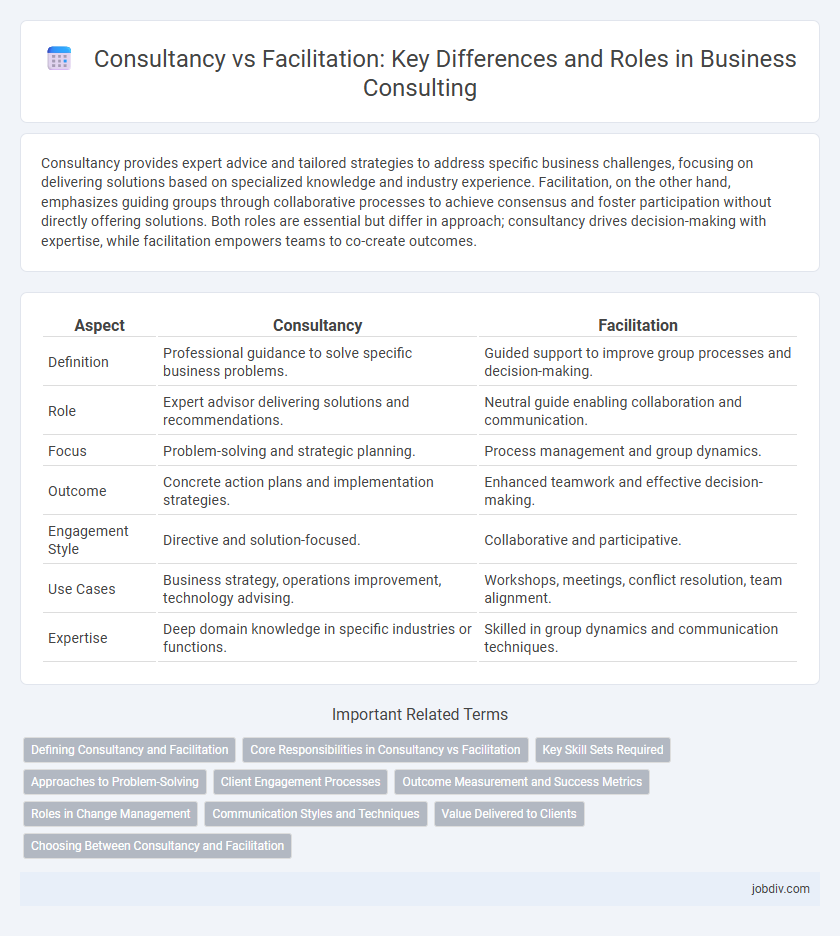Consultancy provides expert advice and tailored strategies to address specific business challenges, focusing on delivering solutions based on specialized knowledge and industry experience. Facilitation, on the other hand, emphasizes guiding groups through collaborative processes to achieve consensus and foster participation without directly offering solutions. Both roles are essential but differ in approach; consultancy drives decision-making with expertise, while facilitation empowers teams to co-create outcomes.
Table of Comparison
| Aspect | Consultancy | Facilitation |
|---|---|---|
| Definition | Professional guidance to solve specific business problems. | Guided support to improve group processes and decision-making. |
| Role | Expert advisor delivering solutions and recommendations. | Neutral guide enabling collaboration and communication. |
| Focus | Problem-solving and strategic planning. | Process management and group dynamics. |
| Outcome | Concrete action plans and implementation strategies. | Enhanced teamwork and effective decision-making. |
| Engagement Style | Directive and solution-focused. | Collaborative and participative. |
| Use Cases | Business strategy, operations improvement, technology advising. | Workshops, meetings, conflict resolution, team alignment. |
| Expertise | Deep domain knowledge in specific industries or functions. | Skilled in group dynamics and communication techniques. |
Defining Consultancy and Facilitation
Consultancy involves providing expert advice, strategic analysis, and tailored solutions to address specific organizational challenges or improve business performance. Facilitation focuses on guiding group processes, enabling collaboration, and encouraging participation to achieve consensus and shared outcomes. Both roles aim to enhance decision-making but differ as consultancy delivers recommendations while facilitation fosters group dynamics and collective problem-solving.
Core Responsibilities in Consultancy vs Facilitation
Consultancy involves diagnosing problems, providing expert advice, and delivering tailored solutions to improve business performance, while facilitation focuses on guiding group discussions and processes to achieve consensus and collective decision-making. Consultants take ownership of the outcomes by recommending strategies and implementation plans, whereas facilitators remain neutral, enabling participants to explore ideas and reach agreements independently. Core responsibilities in consultancy emphasize expertise, analysis, and solution delivery, contrasting with facilitation's emphasis on communication, process management, and stakeholder engagement.
Key Skill Sets Required
Consultancy demands in-depth expertise in industry-specific knowledge, strategic analysis, and problem-solving to provide actionable recommendations that drive business outcomes. Facilitation requires strong interpersonal skills, conflict resolution abilities, and the capacity to guide diverse groups toward consensus and collaborative decision-making. Both roles necessitate effective communication, but consultancy prioritizes analytical proficiency while facilitation emphasizes process management and stakeholder engagement.
Approaches to Problem-Solving
Consultancy typically involves experts providing specialized advice and actionable solutions based on their deep industry knowledge, focusing on diagnosing issues and implementing strategies. Facilitation centers on guiding groups through collaborative processes to unlock collective insight and promote consensus-driven decision-making. While consultancy relies on authoritative recommendations, facilitation emphasizes empowering participants to generate and own outcomes.
Client Engagement Processes
Consultancy focuses on providing expert advice, diagnosing problems, and delivering tailored solutions based on industry knowledge and data analysis to drive strategic decisions. Facilitation emphasizes guiding client teams through structured processes, encouraging collaboration, and eliciting group insights to co-create outcomes that enhance engagement and ownership. Effective client engagement processes blend consultancy's expertise with facilitation's interactive approach, enabling organizations to implement sustainable change and achieve measurable results.
Outcome Measurement and Success Metrics
Consultancy typically emphasizes delivering tailored solutions and measurable outcomes through expert analysis and strategic recommendations, focusing on client-specific success metrics such as ROI, efficiency gains, and project milestones. Facilitation centers on guiding group processes and enabling collaborative decision-making, where success is often measured by participant engagement, consensus achievement, and quality of outcomes produced. Both approaches require clear outcome measurement frameworks but differ in their roles: consultants drive solutions, while facilitators empower stakeholders to co-create results.
Roles in Change Management
Consultancy in change management involves providing expert advice, diagnosing organizational challenges, and recommending strategic solutions to achieve desired outcomes. Facilitation focuses on guiding groups through collaborative processes, encouraging participation, and enabling stakeholders to co-create change initiatives. Both roles are critical, with consultancy emphasizing analysis and strategy, while facilitation prioritizes engagement and consensus-building during change efforts.
Communication Styles and Techniques
Consultancy emphasizes expert-driven communication, where consultants analyze problems and deliver tailored solutions using direct, authoritative language and data-backed recommendations. Facilitation relies on interactive communication styles, encouraging participatory dialogue, active listening, and open-ended questioning to empower group collaboration and consensus-building. Both approaches employ specific techniques--consultants use structured presentations and diagnostic assessments, while facilitators utilize workshops, brainstorming sessions, and conflict mediation to guide discussions.
Value Delivered to Clients
Consultancy delivers value to clients by providing expert analysis, strategic recommendations, and actionable solutions tailored to specific business challenges. Facilitation focuses on enabling client teams to collaboratively generate ideas, make decisions, and implement changes, fostering ownership and sustainable results. Combining both approaches maximizes client outcomes through expert guidance and empowered internal engagement.
Choosing Between Consultancy and Facilitation
Choosing between consultancy and facilitation depends on whether an organization needs expert-driven solutions or collaborative problem-solving. Consultancy offers specialized knowledge and actionable recommendations, ideal for addressing complex challenges requiring external expertise. Facilitation emphasizes guiding group discussions and fostering consensus, making it suitable for teams seeking collective input and shared decision-making.
Consultancy vs Facilitation Infographic

 jobdiv.com
jobdiv.com